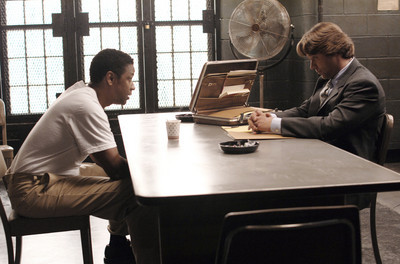‘American Gangster’

Baseball season has ended, but the analogies linger on.
Take the one about swinging for the fences — when all you should worry about is making contact.
That’s precisely what happens in "American Gangster," the rags-to-riches saga of ’70s Harlem heroin kingpin Frank Lucas — and Richie Roberts, the tough-but-honest Jersey cop who brought him to justice.
Denzel Washington, who’s already got two Academy Awards, plays Lucas. Russell Crowe, who only has one Oscar (a situation that’s likely to change before he retires), plays Roberts.
Ridley Scott, who directed Crowe to his Oscar in 2000’s "Gladiator," calls the shots. And they’re all working from a script by Steven Zaillian, who won his own Oscar in 1993 for adapting "Schindler’s List."
You’d expect a movie with that kind of pedigree to be nothing short of an instant classic.
Alas, "American Gangster" fails to live up to its promise. And, even more damagingly, almost everyone involved with "American Gangster" behaves as if it does.
Starting with its title, "American Gangster" announces its lofty intentions (and pretensions), positioning itself as the next indisputable entry in the pantheon of all-time great mob movies.
But it’s dangerous to create such assumptions — especially when you can’t deliver the goods.
Make no mistake, "American Gangster" boasts many attributes, not the least of which is Washington’s quietly spellbinding performance.
As his Oscar-winning turn in "Training Day" demonstrates, Washington loves playing bad guys — and "American Gangster" Frank Lucas is a really good bad guy.
He’s an up-by-the-bootstraps type whose street smarts, business acumen and killer instinct would have made him a winner in any business.
Because his business is heroin, Lucas emerges as a fascinating conundrum of a character — a success story, however distorted, of all-American proportions.
By itself, Lucas’ story would have been enough to power "American Gangster." But the movie makes the mistake of trying to give equal weight to the dogged cop who finally ends Lucas’ reign.
Not that Richie Roberts — especially as embodied by the live-wire Crowe — lacks interest.
Richie’s the kind of guy who has no problem cheating on his wife (Carla Gugino) but refuses to pocket millions of dollars seized during a narcotics bust, prompting his fellow cops to distrust him as much as his wife already does.
Little wonder, then, that she’s determined to end the marriage and start over elsewhere, embroiling Richie in a melodramatic custody battle that seems imported from another, sappier movie.
As riveting as Crowe can be — and that’s plenty — Richie’s story isn’t nearly as compelling as "American Gangster" thinks it is.
Zaillian’s screenplay (inspired by a 2000 New York magazine story by Mark Jacobson) tries mightily to draw parallels between its protagonists.
And while both Lucas and Roberts are mavericks who live by their own codes, their stories don’t reflect each other enough to justify the movie’s parallel-lives narrative.
That, in turn, throws "American Gangster" off balance.
So do Scott’s epic instincts, which sometimes clash with "American Gangster’s" down-and-dirty mood, giving the movie a curiously mercurial vibe. Sometimes it’s stately and operatic. Sometimes it’s jittery and tense — rather than intense. And sometimes it vacillates between the two extremes, marking time until it can make up its mind.
The two constants throughout remain a persuasive atmosphere (thanks to cinematographer Harris Savides, who also shot the ’70s-centric "Zodiac," and production designer Arthur Max) and top-chop performances.
They extend from the exemplary leads to such supporting standouts as "Mod Squad" veteran Clarence Williams III (still oozing cool as Frank’s mob mentor), Ruby Dee (a tower of power as the Lucas family matriarch), Armand Assante (all sly silk as Frank’s Mafia counterpart), the chameleonic Chiwetel Ejiofor (as Frank’s country-bumpkin kid brother, who discovers his inner Superfly when he hits Harlem) and even Cuba Gooding Jr., reminding everyone why he once won an Oscar himself, as flamboyant rival Harlem drug lord Nicky Barnes.
The documentary "Mr. Untouchable" (which played the CineVegas film festival in June) explores Barnes’ life and times in gripping detail. Watching "American Gangster," I couldn’t help wonder "what if" the movie had focused on the Frank Lucas-Nicky Barnes rivalry instead of a cat-and-mouse pursuit that’s too pompous to really qualify as a chase.
But, as my beloved grandfather used to remind me, you can’t dwell on what might have been. You have to "look at what’s up there on the scoreboard."
In the case of "American Gangster," it’s a movie that, while far from a strikeout, is also far from the grand slam it so desperately wants to be.
Contact reporter Carol Cling at ccling@reviewjournal.com or (702) 383-0272.
CAROL CLINGMORE COLUMNSVIDEO
watch review
movie: "American Gangster" running time: 158 minutes rating: R; violence, pervasive drug content and profanity, nudity, sexual situations verdict: C+ now playing: Boulder, Cannery, Cinedome, Fiesta, Green Valley, Neonopolis, Orleans, Palms, Rainbow, Red Rock, Santa Fe, Showcase, South Point, Suncoast, Sunset, Texas, Drive-in DEJA VIEW Frank Lucas is hardly the first "American Gangster" to court cinematic immortality. A few who’ve already achieved it: "Little Caesar" (1931) — Edward G. Robinson’s powerhouse performance as ambitious New York hood Enrico "Rico" Bandello kicked off Hollywood’s ripped-from-the-headlines gangster boom. "Public Enemy" (1931) — James Cagney joins the gang as ruthless Chicago racketeer Tom Powers, who guns down his enemies — and smacks his girlfriend with a grapefruit in the kisser. "Scarface" (1932) — Subtitled "Shame of a Nation," Paul Muni’s electrifying portrait of psychotic Al Capone substitute Tony Camonte paves the way for the 1983 update with Al Pacino. "The Godfather" (1972) — Director Francis Ford Coppola’s Oscar-winning Mafia dynasty — starring Marlon Brando and Al Pacino — remains, with its 1974 sequel, the gold standard in gangster epics. "GoodFellas" (1990) — Director Martin Scorsese’s dynamic account of real-life wiseguy Henry Hill (Ray Liotta), with Robert DeNiro, Oscar-winner Joe Pesci and future "Sopranos" regular Lorraine Bracco. — By Carol Cling












